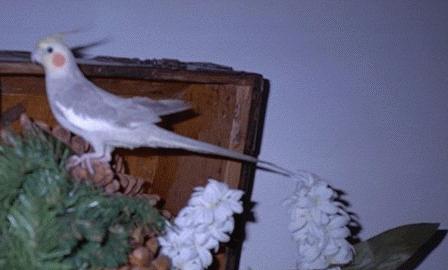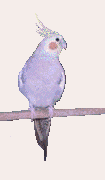 | |
A cockatiel's lifespan can be between 10 years to 25 years at their maximum with real good care. However it has been documented on a rare occasion for a cockatiel to live to about 30 years old!!! This is, "Lucky" my cockatiel. You can distinguish a Cockatiel by the orange spot on both sides of the bird's head. All cockatiels have this distinguishing mark. Most also have a yellow head, but not all. The albino cockatiel is completely white except for these same orange spots on the head. | |
 | |
Lucky also is a female. There is no sure way to distinguish a male from a female. Alt least not without medical tests and x-rays. The one sure way is to wait two years, and if the bird lays an egg, she is a female! Lucky started this, this past year and is currently working on her Third set. (September 20, 1997) I also have found out some new information about cockatiels. It is possible for them to lay a second set of eggs late in the summer and early fall. Lucky is now working on her 7th egg in this third set.. | |
 | |
Cockatiels can also live hapily with other birds. But this too depends mostly on the bird's personality, but there should rarely ever be a problem with more then one type of bird living together. Lucky here is seen with her friend Figero (Fig for short). They cannot stand to be apart. In fact, they will call to eachother if seperated. Occasionally they will peck at eachother, but they never hurt eachother. It is just their way of telling eachother to, "Leave me alone for a while." Later they will be seen swinging toghther off the bottom rail of the cage or eating together. | |
Cockatiels are small, usually grey birds with a yellow crest and a long tail. They usually grow to be about 12 inches long from the top of their heads to the end of their tails. They also weigh about 100 to 110 grams full grown. Cockaties also can be all white, or all sorts of other shades of grey. Generally cockatiels are gray with the exception of the albino (Lutino cockatiels I believe they are called) which is all white. Cockatiels are very clean birds and require little care (That is cleaning). However, cockatiels produce a fine gray dust that comes from the formation of new feathers. This is not bad usually and can be easily cleaned by dusting. Males are usually brighter than females and can be more vocal, as I am told. I find a bird will be more noisy if ignored. Meaning that they probably are just bored. If held their normal amount of time, they are usually quieter. The female will each year nest, once she has reached maturity. This is usually the second year, but can be prolonged if disturbed or placed under stress. The female cockatiel will lay approxamently six to nine eggs in a setting. This will occur in early to mid spring and usually end around mid summer if left to set. It is possible for the bird to also start a second clutch of eggs in the late summer or early fall. The nesting bird will usually choose a place that is in her normal territory (the cage) and she will begin house keeping to clean the area when she is about to lay her eggs. They prefer that area to be clean. I find that my bird is happy with nothing but the paper towels on the bottom of the cage. She does not build any kind of, "nest". Her habits are to curl up in a quiet corner and lay there quietly, after she cleans the area she is going to nest in. Generally cockatiels are very affectionate and sweet-tempered. They love to be involved in every aspect of their owner's lives including showering with people! They will also demand to be allowed to eat off your plate and occasionaly ride on your shoulder. If left alone they may just climb out of the cage, scream at you, and fly/walk over to where you are! Cockatiels are intelligent birds and can easily figure out the sound of a bag of chips being opened! If they figure this out (and they will!) beware! They will become very excited because it is their God-given right to be fed such chips! Generally cockatiels are quiet even when excited, well they may chirp once real loud but that usually satisfies them! They also will make quiet sounds when happy, but again generally they are quiet. Also beware of a female that is nesting! Normally a cockatiel will hiss and peck at you but still not hurt you if they are mad or angry. BUT the female will pierce the skin if you reach in as she is nesting! This is a normal response and as soon as she leaves the nest she is ready to be held again. And she will let you know this too! Be prepared to spend time with your bird. They enjoy your company and get lonely easily. They do not require a lot of time but they require consistant time. Talk to them and hold them every day, and spend at least 30 minutes to an hour with them every day. This does not have to be done in one setting, but can be broken up into several few minute sessions. Just let them know you care! :-) You need to give them clean water daily along with fresh food. Remember even though they may still have water, they love to take a bath in it, so the water needs to be changed daily. They also will poop in their food dish if it is not well placed, so again you need to clean out the seed dish daily. They also only eat the seed on top so the hulls that remain on top of the seed dish should be blown off daily so they can easily get to the new seed. Approximately once a week you should clean the bottom of the cage by removing the paper at the bottom of the cage and replacing that with new paper and washing anything that is unduely dirty. This should be enough for cleaning, but sometimes the birds will not just poop on the paper, so periodic cleaning elseware may be required with a little more effort. Take this link to get the low down on their eating habits! | |


